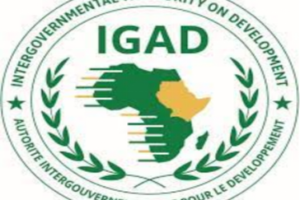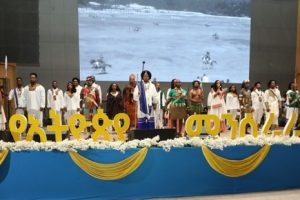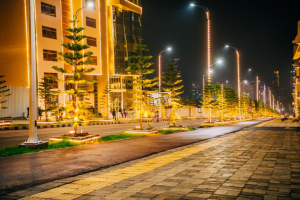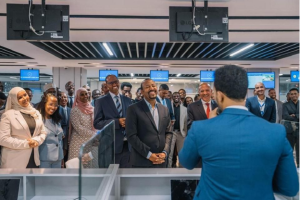BY FITSUM GETACHEW
Ethiopia’s contribution for the liberation of African countries is well known. The Battle of Adwa has always been mentioned in this context as a precursor to the movement of pan Africanism which was later to be a household name in Africa and among people of African descent who have been struggling to liberate themselves from the dominion of western powers mainly Europeans and Americans. For too many years Africans and people of African descent have been subjected to various forms of mistreatment and prejudice even after they have begun to stand up for their rights awakening peoples’ movements. In Africa the colonial yoke has been too heavy to carry for many decades and even after the so called African liberation from the colonizers the voices of Africans have not enjoyed the kind of attention they would have deserved and were not listened to.
In many ways reports show that Africa is among the richest continents of the world with so many kinds of precious minerals found beyond fuel and natural gas and the like; and yet it is the poorest continent on earth. It is a continent with the poorest people living in it and for decades it has been mistreated by its former colonizers in many respects. Ethiopia has been in the forefront of the battle for independence and dignity when it resisted bravely to all forms of colonization. The Battle of Adwa is only one instance of this battle that is best recognized and known but even this has not received the attention it deserves when it is marked every March 2, the day the battle took place. It was the first true and major resistance to an alien aggression and invasion by a huge European power. But there have also been many others recorded in history books when Ethiopia successfully foiled alien domination and kept its people safe from subjugation.
Today one may say that the entire continent is free from colonialism and foreign subjugation but many scholars are heard asserting that it is true only formally because Africans are still at the receiving end of mistreatment by non-Africans. They say the international order is not very friendly to Africa because of a host of factors. Even after independence Africans have not been completely free from the dominion or influence of their former masters or even newly formed powers which practically determine their destiny. To be able to stand together and make their voices heard at the international forum the historical leaders of Africa did manage to come together and found the Organization of African Unity which later on grew to be the African Union with the aim of putting together the fifty five independent countries to one voice and exert as much influence in the world affairs as it needs.
However, sixty years into the formation of this organization it cannot be said that it has achieved many of its purposes. Of course during these years it has successfully fought for the liberation of African countries that were not free from colonialism yet when the organization was first formed. It has been serving as voice for the weaker or smaller countries and the attempts exerted to help them come out of certain crises have been successful. It has also tried to iron out differences among various African countries that otherwise would have chosen the path of destructive conflict rather than sit down around a table and engage in peaceful talks. In this respect a number of success stories have been written and lives have been saved along with resources. The African Peace and Security Council has been active in identifying potential danger areas where risks of war might explode and prevent them or once the hostilities have erupted tried to limit the extent and period of hostilities.
Many observers say that Africa is not allowed to have the voice it deserves for a number of reasons. There are too many interest groups in the world who try and have as much influence as they can and in the process limit Africa’s free growth and expansion. Many say it is not in the interest of these countries that Africa prosper and become a truly independent continent especially if they unite in the true sense of the word. Given that during colonial times Africans have been divided as Anglophones, Francophones and etc. The international languages they use differ based on who colonized them. And this has remained as one of the major obstacles for a true union among the fifty five states.
One of the bad legacies of colonization has been the efforts exerted by the foreign powers to induce Africans to hate their true identity and nature and push them to imitate their masters as much as possible. The policies were aimed to integrate these countries to the dominant culture of the colonizers and in this sense Africans were made to divide between themselves. Africans could not develop their culture and be proud of it. In many ways Africans were made to believe that their culture was inferior to the western one and they were made to adopt it rather than proudly develop and nurture their own traditional heritage and culture.
One of the fundamental factors for this to happen is the way the western media has been prospecting African stories, African affairs and everything that has been happening in Africa. Everything that was reported about Africa was seen from the prospect of western interests and long term advantages. Africans were made to be ashamed of their cultural traits and abandon them. The way Africans view themselves has not been positive because of the persistent derogatory words and epithets that have been used to describe them not only in the western media but also in western literature in general. Although the outright racist remarks may have been alleviated along the years, however, there are clear remnants of such tradition that have persisted for years and it will take a lot of time before this trend is completely rid of.
Africans must stand up together and be able to change the state of affairs and the effects will be enormous. Africa will have the dignity it deserves and this will have its implications even in economic terms. Africa could negotiate better terms even in international transactions of its precious resources because talking with one voice they have a major say and a better chance of being listened to. We have seen in the past that there have been relentless efforts to divide Africans and make them be hostile among one another. The differences in the language have been used to promote divisions and stories of conflict, divisions and differences have often been occupying the headlines of western media while if there are positive stories, little focus are accorded them. The perspective of narrating African issues are always considered from the strategic interests of the west and do not do justice to Africa. So much western media is dedicated to negative stories coming from Africa such as conflicts, wars, disagreements among neighboring nations, terrorist activities, drought and famine etc that they have ended up being the norm rather than the exception.
The image of Africa has been deliberately tarnished with only negative stories monopolizing the media. Unfortunately even Africans have begun to flow along the canals these western media have dug. If you take the example of the recent Ethiopian conflict in the north, we can understand well how far the western media can go to support or promote their interest without any regards to the true and tangible story choosing only the negative one and making of it a human rights violations by choosing the side it believes will serve their interests. We have witnessed how powerful these media have been in terms of influencing the neutral people in conflicts and eventually governments that may have had good relations with Ethiopia.
Every attempt was made by so called western conflict experts and analysts to label the government of Ethiopia as the guilty party in the conflict in the north and expose it to the sanctions of some governments and even international organizations. There are many similar biased stories produced and broadcast by western media which have hurt Africans. That is why Africa needs a strong media house of its own that can tell its own stories in its own way without relying on western correspondents who have their own agenda and promote their own interests only. At the just ended 36th AU summit Prime Minister Abiy Ahmed has reiterated his suggestion that Africa needs its own media house to able to produce and narrate its stories on its own and from its own perspective. We cannot agree more. African leaders need to take this suggestion into serious consideration.
THE ETHIOPIAN HERALD THURSDAY 23 FEBRUARY 2023





